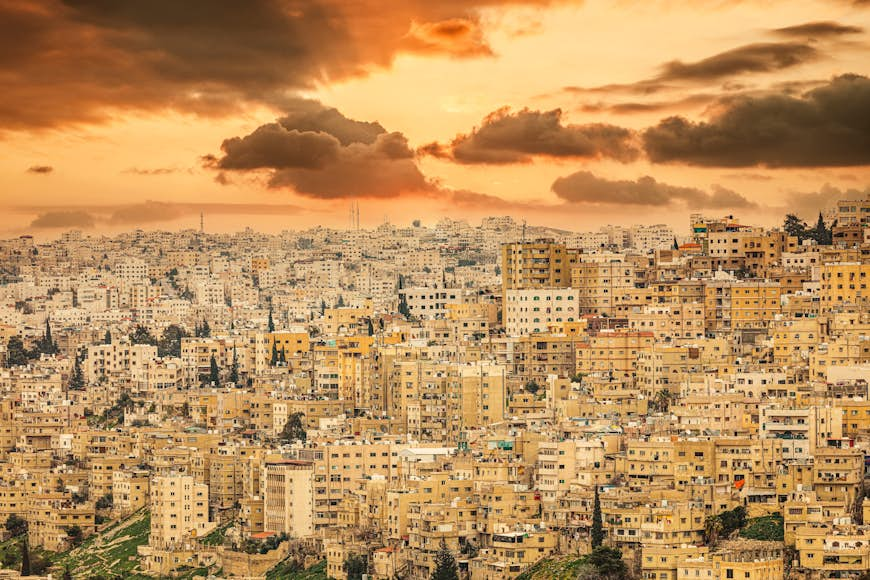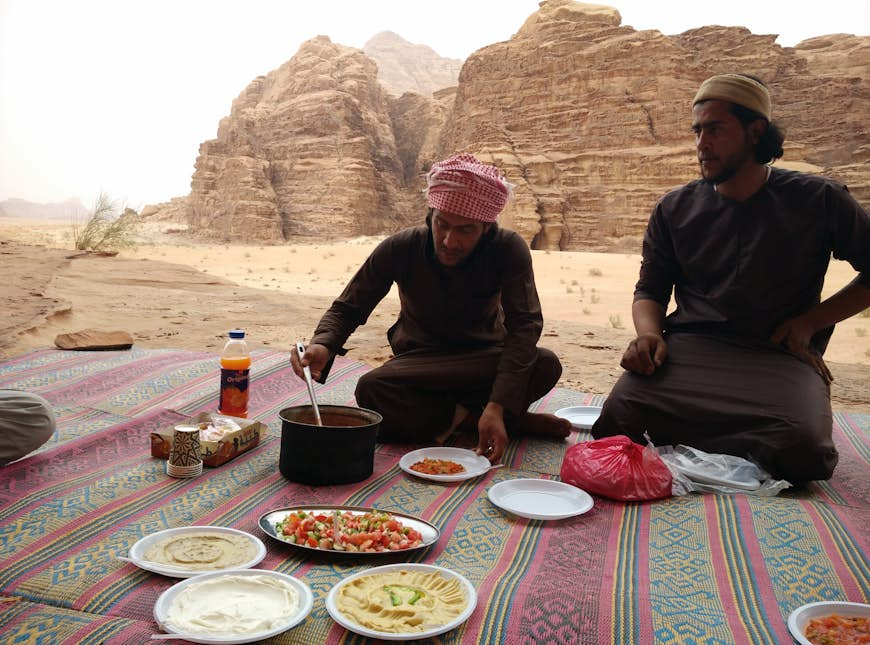There are many reasons to put Jordan on your travel wish list.
Beyond the well-known (and justly famous) cliff-carved city of Petra, visitors here can the explore friendly villages and forested trails of Jordan’s north, the ancient ruins in Amman and the mind-bending Mars-like desertscapes of Wadi Rum. Jordan is a fabulous destination for travelers with an adventurous spirit and an interest in Arab history and culture.
The intensity here – of the weather, traffic and terrain – can be overwhelming for first-time visitors, yet if you let go of your expectations and embrace all that Jordan offers, you’ll likely find warm hospitality and unique experiences you’ll remember forever.
Each of Jordan’s different regions offer destinations with much to see and do (and eat!). Here are nine of the best places to visit in Jordan.
1. Umm Qais
Located about 2 hours north of Amman, Umm Qais is an ideal base for exploring northern Jordan, with its forested trails, farm-to-fork meals, warm hospitality and archaeological sites complete with sweeping views of the surrounding area. We recommend seeking out local experiences (from an experienced operator like Baraka Destinations) – think exploring the Greco-Roman ruins of Gadara, foraging with a local farmer, cooking with a Jordanian chef, cycling the countryside with a local guide or harvesting honey with a local beekeeper. This variety of activities means Umm Qais is an excellent destination for all types of visitors, including families, couples and solo travelers.
Nature lovers and hiking enthusiasts will be spoiled for choice, too, with the Yarmouk Forest Reserve – a favorite of savvy locals like mountaineer Mohammed Ziad Abdullatif – within easy reach. Abdullatif suggests hiring a local guide through the Royal Society for the Conservation of Nature or a tour operator such as Baraka Destinations; such an expert can introduce you to the flora and fauna, and (if you’re lucky) prepare shai (tea) to share in the shade of the deciduous oak trees that grow here.
Planning Tip: Umm Qais is also the starting point for the Jordan Trail; you can book a guided day hike from here to Arab Dam. (We recommend Experience Jordan.) Trek this northern section in the springtime for the highest chance of seeing the region carpeted in wildflowers.
2. Dana Biosphere Reserve
Dana Biosphere Reserve, Jordan’s largest, contains mountains, wadis, more than 600 plant species, nearly 200 bird species, rare mammals such as the Syrian wolf and Nubian ibex, and an archaeological site. Local hikers recommend this area for its unique ecology, varied terrain, incredible views and serenity.
Visitors can make Feynan Ecolodge their home base, before connecting with Bedouin culture and the land through locally led experiences such as grazing goats with a shepherd, hiking in the wadis with a Bedouin guide, baking arbood bread, learning about medicinal plants and making Arabic coffee over a fire. For intrepid travelers looking to stay out under the stars, multi-day hikes in Dana and on the Jordan Trail’s Dana-to-Petra section can be arranged.
3. Jerash
An easy day trip from Amman, Jerash is home to Gerasa, one of the best-preserved Roman cities in the Middle East. You don’t have to be a history or archaeology buff to appreciate the beauty of this impressive site, but it is helpful to hire a guide either on-site or in advance through a tour operator such as Engaging Cultures, as signage is limited. Since the Oval Forum lined by stone columns is a can’t-miss and is best viewed from above, be sure to take the steps up the Temple of Zeus for a panoramic view of the ancient city, with modern-day Jerash in the background.
This region is also known for superior-quality olives and olive oil, with some of the olive trees believed to be hundreds of years old. If you’re traveling to Jordan in September or October, book a multi-day trip with Engaging Cultures that includes an olive-harvest experience, lunch and an overnight with a local family in nearby Orjan, as well as a visit to Ajloun Castle.
Planning Tip: The site at Jerash is vast, so plan accordingly. Count on a minimum of three hours to see the main sights, plus additional time to explore more and for photos. Wear comfortable shoes and bring sun protection.

4. Amman
Don’t make the mistake of just passing through the capital city: Amman is well worth getting to know. More than just a gateway to the country, it’s Jordan’s heartbeat, pulsing with the energy of the old and new, and millennia of history and culture.
If you only have one day in Amman, you’ve got to go straight to the top. Visit the highest hill in the city to find the Citadel, an archaeological site that includes Umayyad Palace and the remaining pillars of the Temple of Hercules. Enjoy 360-degree views and respite from the cars and crowds below.
What goes up must come down – and when you do descend, make a stop at the Roman Theater before wandering Al Balad, the buzzing downtown district, where you’ll find souvenir shops, street souks, argileh (shisha) cafes, and vendors serving up fresh falafel and kunafeh (a Middle Eastern cheese pastry topped with nuts and syrup). Take a stroll on Rainbow Street before ending the evening on a high note with a sunset dinner at one of the city’s rooftop bars or restaurants.
If you have two days in Amman, learn more about the country’s history at the Jordan Museum or dive into Jordanian culture hands first with an interactive class such as a cooking lesson at female-run Beit Sitti or an olive-oil-soap-making workshop at Mosaic House.
5. Madaba
Just 20 minutes from Queen Alia International Airport, Madaba is a convenient and quiet place to rest your head on arrival in Jordan. A friendly and welcoming town for all visitors of all faiths, Madaba is home to one of the largest Christian communities in Jordan. You’ll find several churches in town; visit St George’s Church to admire one of the oldest known maps of the Holy Land, made of mosaic tiles in 560 CE.
Planning Tip: While in the region, save time for a visit to Mt Nebo, just 15 minutes from Madaba. It’s believed Moses saw the Promised Land from the mountain’s summit – a view you can take in, too. Atop the mountain, some of Jordan’s most prized mosaics can be seen at Moses Memorial Church, while a small on-site museum highlights the place’s history.

6. The Dead Sea
Soak and scrub your worries away with a spa experience on the Jordanian shores of the Dead Sea. DIY types can wade in and slather on some mineral-rich mud before floating in the high-salinity water, while beauty mavens can continue the experience at a spa at one of the numerous luxury hotels by the shore. (We love the treatments at the Kempinski Hotel Ishtar.)
In addition to the healing properties of the mineral-filled mud and water, the oxygen-rich air and dry climate of this region are also believed to be beneficial for people with a variety of health conditions. Just keep in mind the heat can be unbearable during the summer.
Planning Tip: In the warmer months, consider an outdoor jaunt in nearby Wadi Mujib – the “Grand Canyon of Jordan” – with a hike in the shade of the gorge followed by a cool dip in the fresh water. You can also hike in the wadis (valleys) near South Ghor on the southern end of the Dead Sea with Al Numeira Environmental Association, then refuel at the organization’s cafe, which serves food and drinks made from locally sourced ingredients.
7. Petra
However long you’re in Jordan, Unesco-listed Petra is somewhere you shouldn’t miss. The “Rose Red City,” so named for the pink stone and sand found here, is massive at 264 sq km (102 sq miles); you could spend hours, a full day or several days trekking the area and marveling at the handiwork and history of the ancient Nabatean culture.
Choose your own adventure depending on your interests, time and ability. If you’re short on time, take the road most traveled and hike through the Siq to reach the Treasury facade. (Yes, Jordan’s most famous site is the carved-stone setting you may have seen in the 1989 movie Indiana Jones and the Last Crusade.)
If you’ve got a full day, map out your can’t-misses in advance. If you have multiple days set aside and want to go beyond the most common sites, book a guided tour that might include storytelling, hiking, Arabic coffee and meals.
Local Tip: Want to see Petra from another angle? Take a tip from Mohammed Ziad Abdullatif and hike to Petra (either from Little Petra or, if you’re up for a more challenging trek, via the multi-day Dana-to-Petra leg of the Jordan Trail) before exploring the ancient city. “The Petra Back Trail from Little Petra to Petra is my all-time favorite hike for its location, scenery, history and that first glimpse of the Monastery when it starts to appear,” Abdullatif says.

8. Wadi Rum
No spaceship is required to visit the Mars-like landscapes of Wadi Rum; modes of transport here instead range from foot and camel to 4WD and even hot-air balloon. Rugged mountains and graceful natural arches in a sea of rust-colored sand make this protected area one of the most photogenic and beautiful places in Jordan – and the world.
Many travelers come seeking a slower pace and long silences, though Wadi Rum has become so popular that you may have to go farther afield, away from the main sites and camps, to find true desert tranquility. You can also spend a day with a Bedouin hiking, cooking and learning how to build a tent.
One of the best places in the world for rock climbing, Wadi Rum also attracts active and adventurous travelers. Book a guided climb and “wild camping” (overnighting in collapsible tents, away from the crowds and larger established camps) with Shabab Sahra and learn from Bedouin who’ve grown up scaling these sandstone giants.
Planning Tip: The Red Sea resort city of Aqaba is an hour’s drive away and the perfect place for an indulgent spa treatment and a luxury stay after working up a sweat in Wadi Rum.
